Artist Sacha Halona Baumann makes a portrait of downtown L.A. one (literal) step at a time
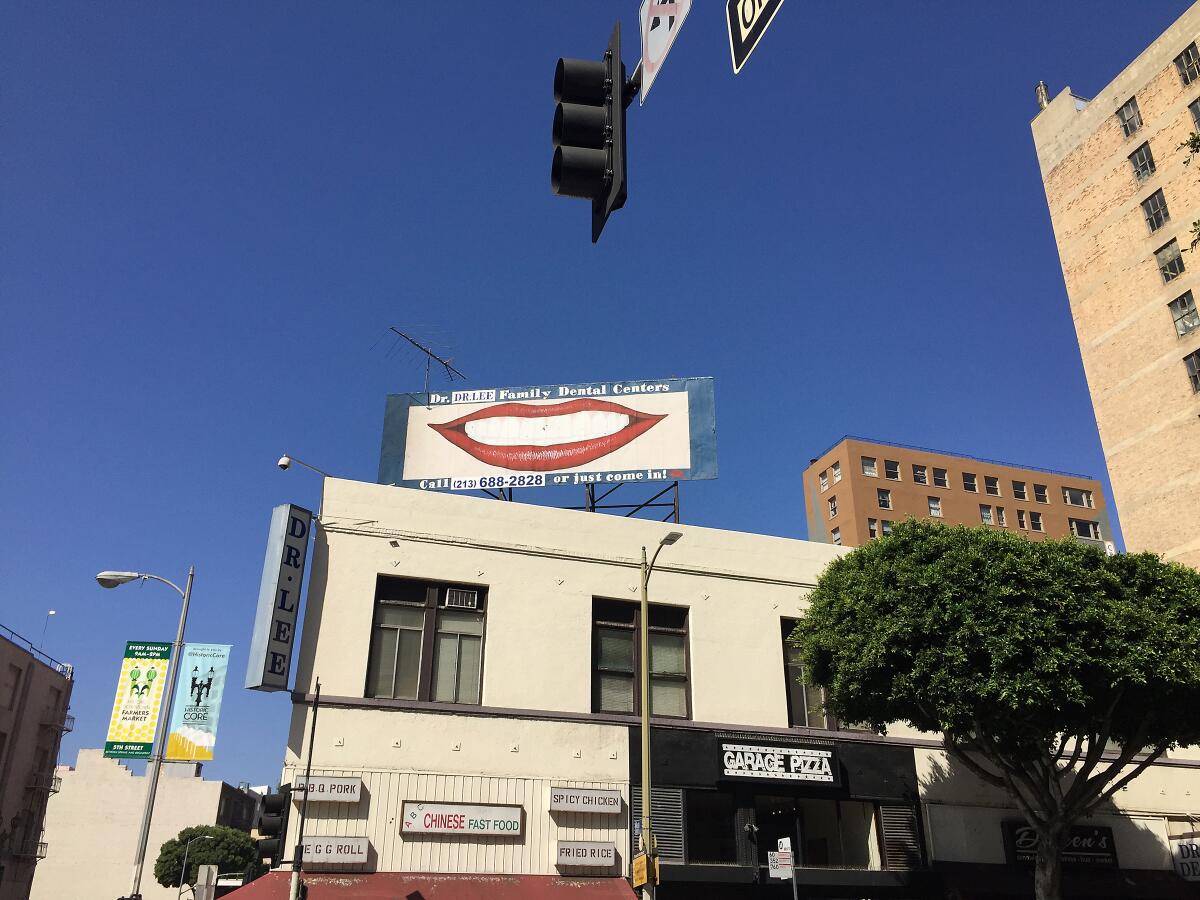
- Share via
I am officially addicted to Boon Sauce chili crisp, which can be generously deployed in this beyond-easy recipe for cold spicy noodles. (You’re welcome.) I’m Carolina A. Miranda, art and design columnist at the Los Angeles Times, and I’ve got all the art world spice:
Walkabout
“I like walking because it is slow, and I suspect that the mind, like the feet, works at about three miles an hour,” wrote Rebecca Solnit in her 2001 book “Wanderlust: A History of Walking.” “If this is so, then modern life is moving faster than the speed of thought, or thoughtfulness.”
For artist Sacha Halona Baumann, walking is not only locomotive, it is where she clears her mind by examining the city’s ever-changing landscape. That‘s downtown Los Angeles, the neighborhood she has inhabited since the early 1990s and assiduously recorded — first with cameras, now an iPhone. “I’ll often walk randomly,” she says. “I’ll turn when a light changes. I take the subway three times a week. And my eyes will drift to something repeatedly and I’ll notice changes.”
That shifting downtown landscape is at the core of her book, “Step and Repeat,” published last year, which gathers hundreds of images captured between 2014 and 2022 exclusively on a smartphone.

These are not grand images of the L.A. skyline with its recognizable architectural icons. Instead, they are quickly snapped smartphone pics that zero in on the small details that Baumann observes on her walks: the pattern of a brick wall, the shadows cast by a fire hydrant studded with an array of knobs, a faded graphic of roasted chickens, a hand-painted sign laced with eyes that offers gold barato barato — cheap cheap.
Some of these details might seem mundane. But as you pore over her book, the forms begin to repeat — like those knobby fire hydrants or the baroque facade of the Los Angeles Theatre, the faded-yet-glamorous 1931 movie palace designed by S. Charles Lee and S. Tilden Norton. Though the subjects of her photos reoccur, they are never the same. Sometimes the light is stark; other times it has been diffused by morning fog. At times, the shadows are long; at others, barely perceptible. Here you might see the facade of a theater; elsewhere you’ll find the industrial backside.
One repeating theme is the image of scorpion pendants in jewelry store windows. Baumann, who is a Scorpio, says , “Scorpios are sort of like vegans — they like it when everybody knows it.” (As a fellow Scorpio, I can confirm this.)
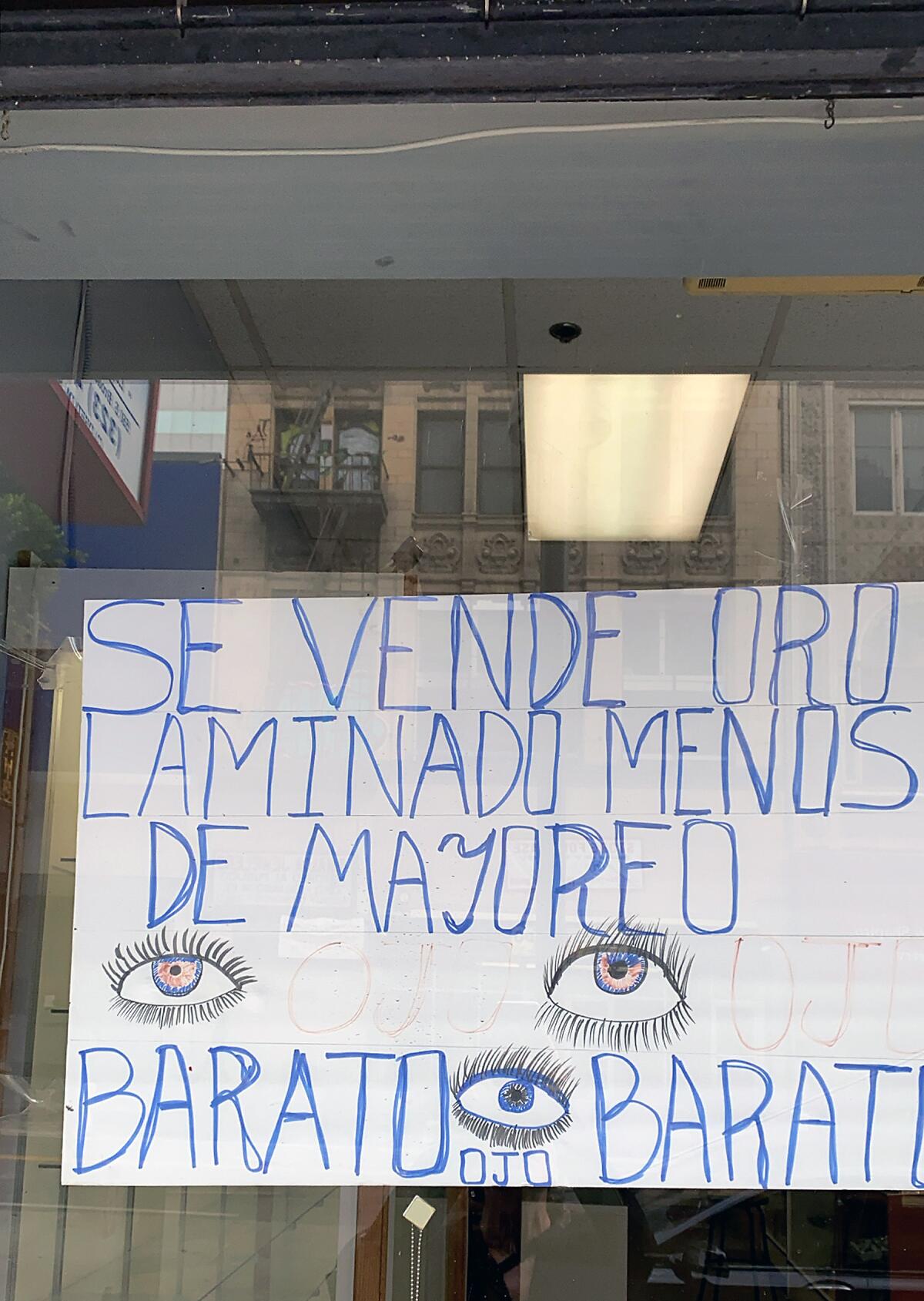
The artist’s images do not obscure downtown L.A.’s more brutal aspects: the inhuman scale of its loading docks or the myriad architectural barriers that are erected to purportedly protect the city from its people. But neither do they exploit or fetishize the city’s grit. The pictures are straightforward and sympathetic. As Baumann puts it: “I think of them as being generous.”
In the same way that she lets certain limitations shape some of her walks downtown — such as simply turning if she is unable to cross a street — she likewise set a series of arbitrary conditions for “Step and Repeat.” One, she only selected photos dating back to 2014 because that’s how far back she has smartphone images warehoused on her iCloud account. And the book’s length — 480 pages — was determined by the maximum allowable by Blurb, the service she used to publish the work.
Make the most of L.A.
Get our guide to events and happenings in the SoCal arts scene. In your inbox every Monday and Friday morning.
You may occasionally receive promotional content from the Los Angeles Times.
Images were then chosen at random, though once these were selected, she organized them in ways that create interesting juxtapositions of color and form.
“You can open it up to any page and you can find a story,” she says.
Baumann also works as a curator, art consultant and graphic designer. For two years, she published the arts broadsheet “Full Blede” featuring the work of artists — mostly imagery, but also short stories, essays and poems.
On Saturday, 17 images from her downtown series — devoted to orange traffic cones — will be on display at the Brand Library and Art Center in Glendale as part of the group show “Don’t Believe Everything You Think.” Also on display will be a copy of the book.
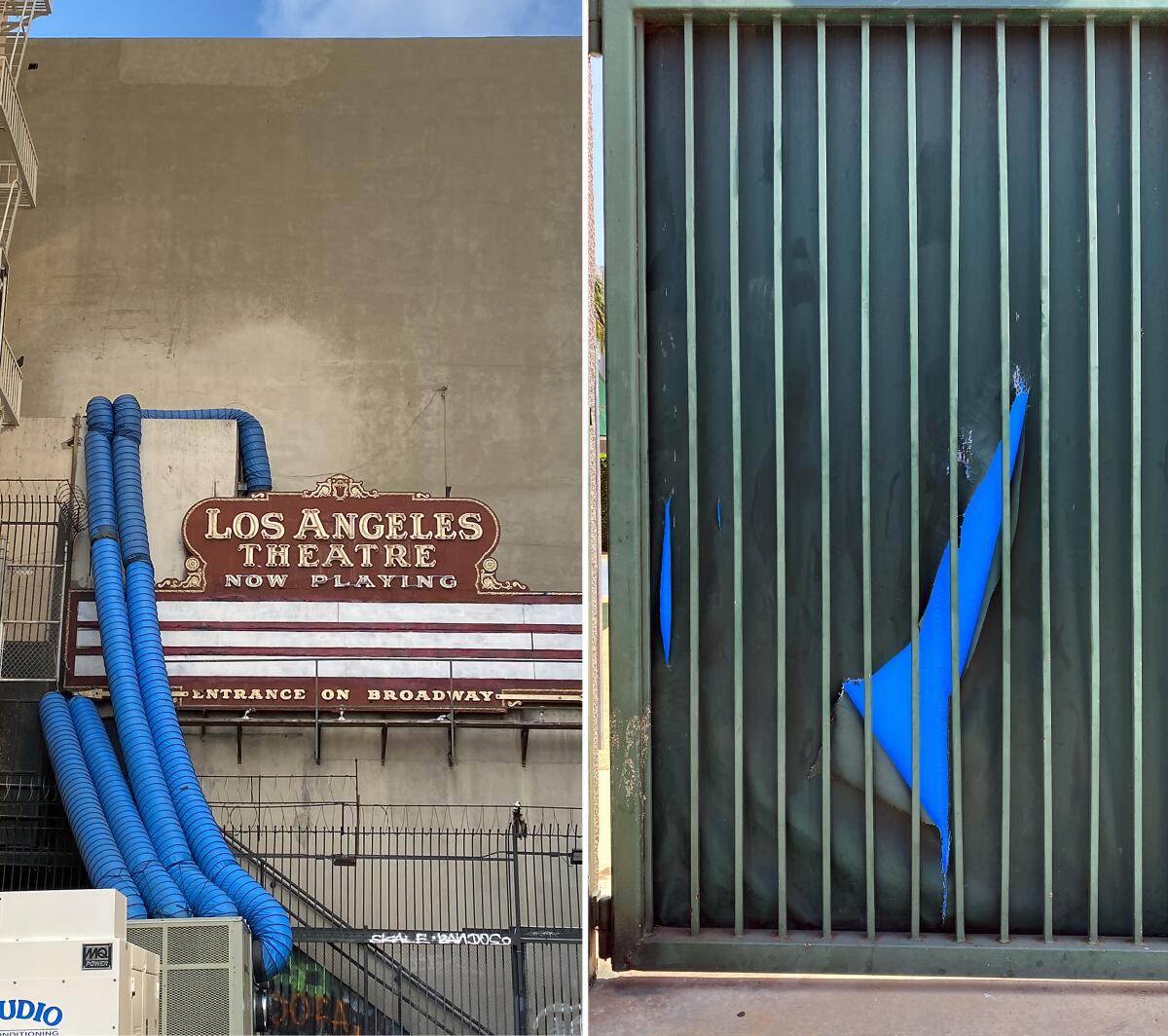
But it’s worth hanging out with her book beyond the gallery, sitting with it, revisiting it and letting the little corners of L.A. engage in their relentless chatter.
Appearing more than once in Baumann’s book is an image of a dental billboard that features a smiling mouth rising from a building’s rooftop. It’s Cheshire Cat-like grin is unconnected to any face and depending on the angle, the mouth can feel friendly or strained — L.A.’s answer to the eyes of Dr. T.J. Eckleburg, the fictional billboard that plays an all-seeing role in F. Scott Fitzgerald’s “The Great Gatsby.”
The dental billboard — for the practice of one Dr. Lee — is one I’ve long been fascinated by and have, in fact, photographed in the past.
What is the mouth trying to tell us? The answer to that depends on when or how you look.
“Don’t Believe Everything You Think,” curated by Galia Linn, opens at the Brand Library 6 p.m. Saturday. Find details at brandlibrary.art. You can find Sacha Halona Baumann’s “Step and Repeat” available for purchase at sachabaumann.com.
On and off the stage
Premiering this week at the Geffen Playhouse was “Ava: The Secret Conversations,” a play adapted from the book, “The Secret Conversations,” which captures the closing chapters of the life of the mercurial Ava Gardner, played by Elizabeth McGovern (of “Downton Abbey” fame). “Not many contemporary actors could summon to the stage Gardner’s radiance and decrepitude simultaneously,” writes Times theater critic Charles McNulty. “The character’s flirtatious ploys have an air of desperation, but a spell is nonetheless cast so that the audience can’t help falling into a romantic trance.”

For the record:
3:41 p.m. April 23, 2023An earlier version of this newsletter misidentified the director of “1776” as Ryan Cantwell. The musical was co-directed by Jeffrey L. Page and Diane Paulus.
The nontraditional, ethnically diverse revival of the Tony-winning “1776,” co-directed by Jeffrey L. Page and Diane Paulus, is now on stage at the Ahmanson, more than 50 years after its original debut — with an all-female-identifying, nonbinary and transgender cast (basically everyone that wasn’t in the room when it happened). This intriguing musical — I caught it last week — tells the story of how U.S. independence came to be and offers a more honest appraisal of the role that slavery played in that equation than “Hamilton” (to which it is inevitably compared).
“The message, that the American experiment failed before it even began, isn’t a radical take on history at this point,” writes contributor Margaret Gray in her review of the show. “What feels fresh, and heartening, is the reminder that we don’t have to be limited forever by the errors of history. We can invite more people to the meeting.”
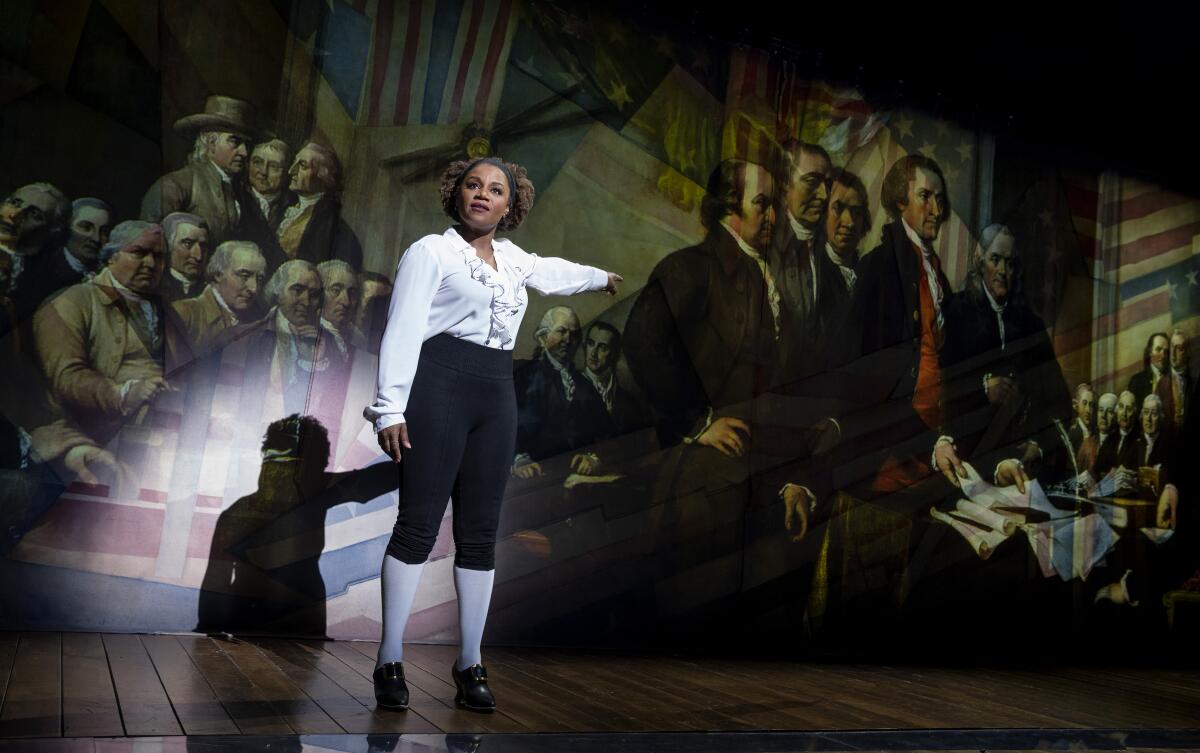
“Phantom of the Opera” has concluded after the longest run in Broadway history. Composer Andrew Lloyd Webber dedicated the final performance to his late son Nicholas Lloyd Webber. “This has been a season of goodbyes, personal and public,” Webber wrote in a guest essay for the New York Times. “With the curtain now fallen in New York on the musical that has been the biggest of my career, I passionately pray that Broadway rediscovers the appetite for new scores and original work.”
New York Times culture writers Joshua Barone, Alexis Soloski and Elisabeth Vincentelli parse the show’s legacy.
In and out of the galleries
Artist Sherrill Roland‘s exhibition at Tanya Bonakdar Gallery is inspired by his journey through what he describes as the “broken American criminal justice system.” The show, reports The Times’ Deborah Vankin, features works made out of the materials he had access to or saw while incarcerated — such as an etched wall piece that employs Kool-Aid in lieu of pigment or paint. Others evoke the architecture of the prison system. As he tells Vankin: “I couldn’t see a bird, I couldn’t see a cloud.”
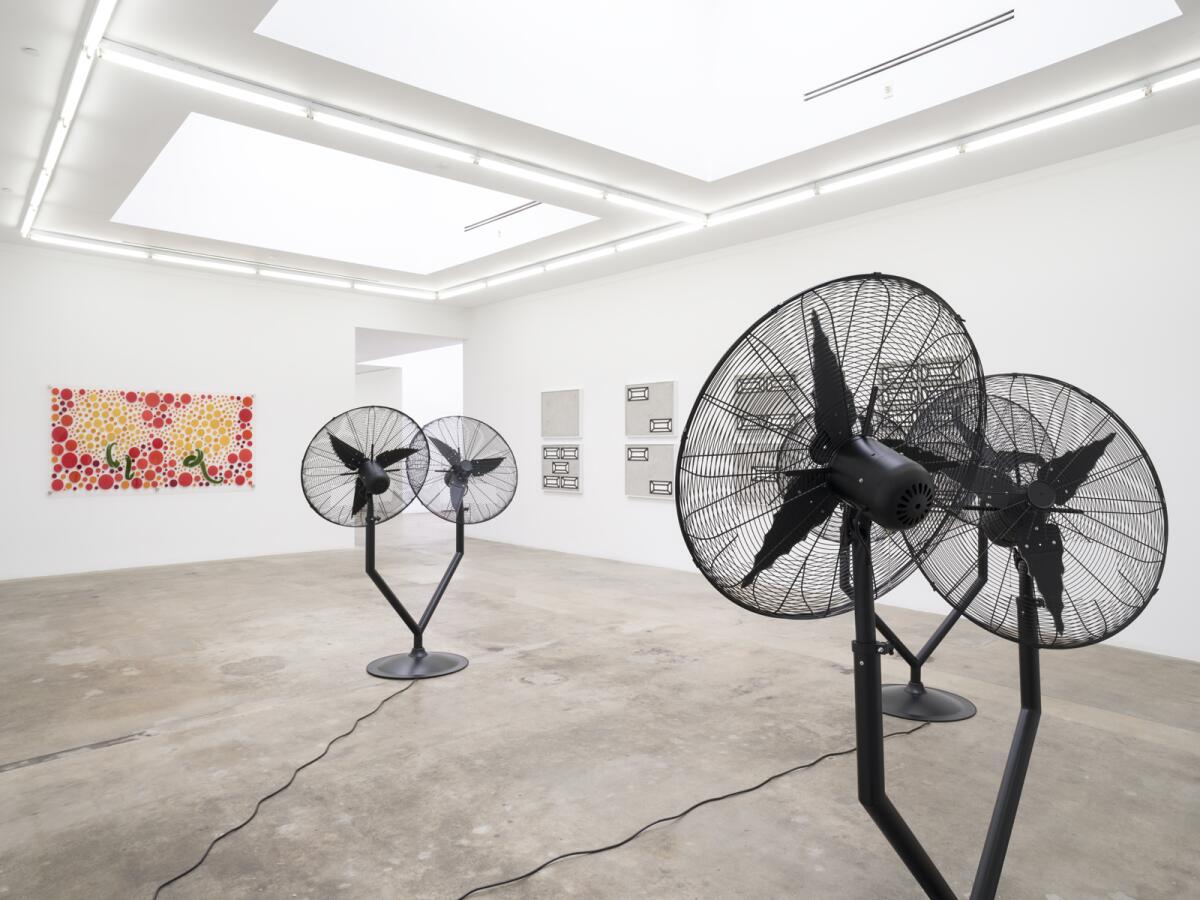
Vankin also reports that the Hammer Museum has announced its lineup for the fall’s “Made in L.A” biennial. The show is being organized by independent curators Diana Nawi and Pablo José Ramírez with Ashton Cooper, and the final list includes painters Joey Terrill and Marcel Alcalá, performance artist Jibz Cameron (better known as Dynasty Handbag), multimedia artists Young Joon Kwak and Sula Bermúdez-Silverman, the musical collective Más Exitos and maaaany more.
Here’s hoping the show features a performance by Dynasty Handbag.
MOCA had its annual gala fundraiser over the weekend and The Times’ Steven Vargas was at the techno-inspired party, which helped raised more than $2.7 million. There was lamé, there were fishnets and there were some thumping beats — courtesy of artist and DJ Carl Craig, who currently has a sound-based installation on view in the museum’s Little Tokyo space.
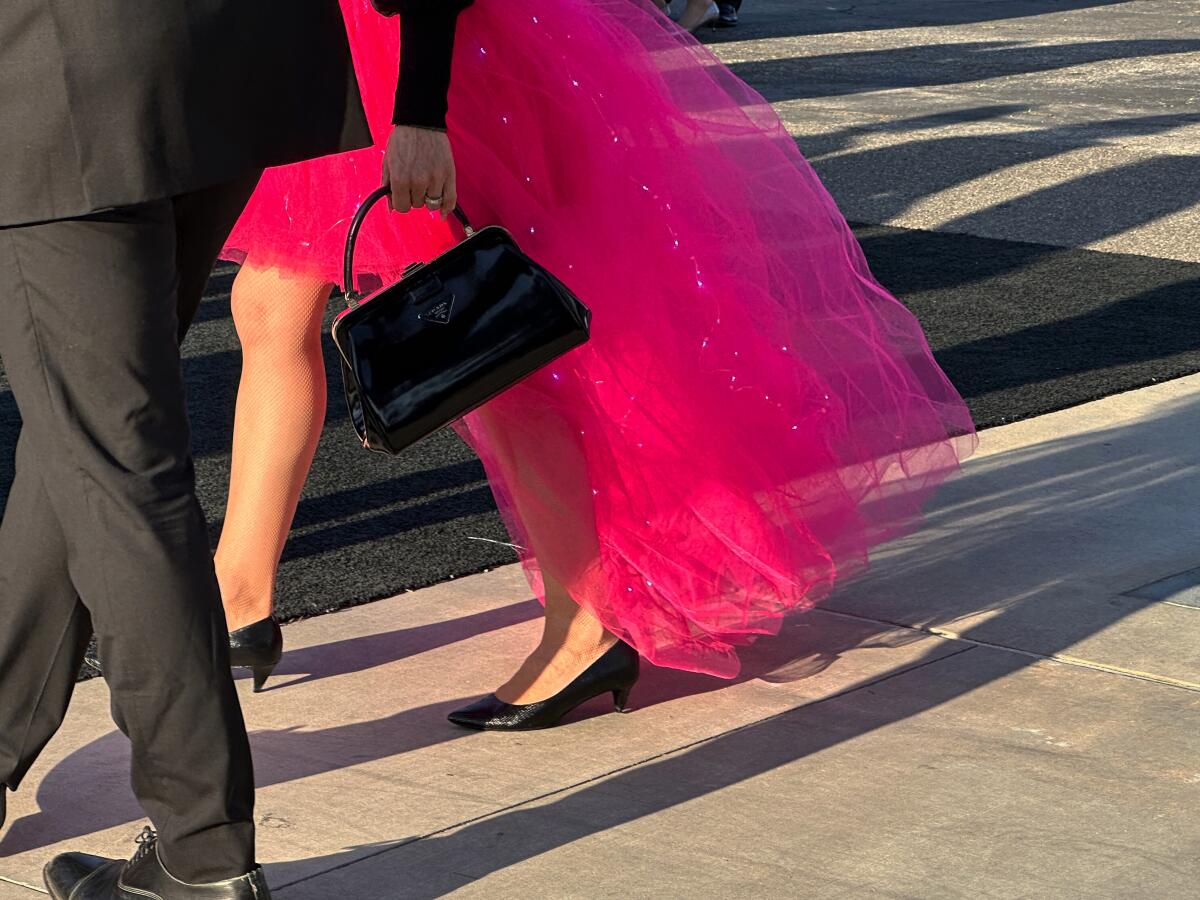
The Times’ Laurie Ochoa, general manager of food (and my former boss!), writes about the Norton Simon‘s new exhibition “All Consuming: Art and the Essence of Food” which contrasts images of excess with poverty. “The hunger and excess juxtaposition from past centuries is, of course, just as relevant today in a city where people living on the streets are sometimes a few yards away from restaurants serving tasting menus costing hundreds of dollars,” writes Ochoa.
L.A. artist Lauren Halsey has brought a monument to Black life to the rooftop of the Met in New York. New York Times critic Holland Cotter describes it as “one of the best” in the Met’s series of roof garden commissions. (She presented an earlier version of the concept at the Hammer Museum back in 2018.)
Plus, photographer Camilo José Vergara digs into one element that has appeared in Halsey’s work: a hand-painted sign for braids by Jade that he photographed in the ’90s.
Classical notes
For years, Rachmaninoff was a no-go zone for the classical avant-garde. That has changed, writes Times classical music critic Mark Swed. “Rachmaninoff has gone from being widely viewed as a musical archconservative to a protomodernist.” Of a recent concert by Conrad Tao at the Soraya, Swed notes that the pianist marked the 150th anniversary of Rachmaninoff’s birth with a show that presented the composer in combination with music by figures such as Stephen Sondheim and Irving Berlin.
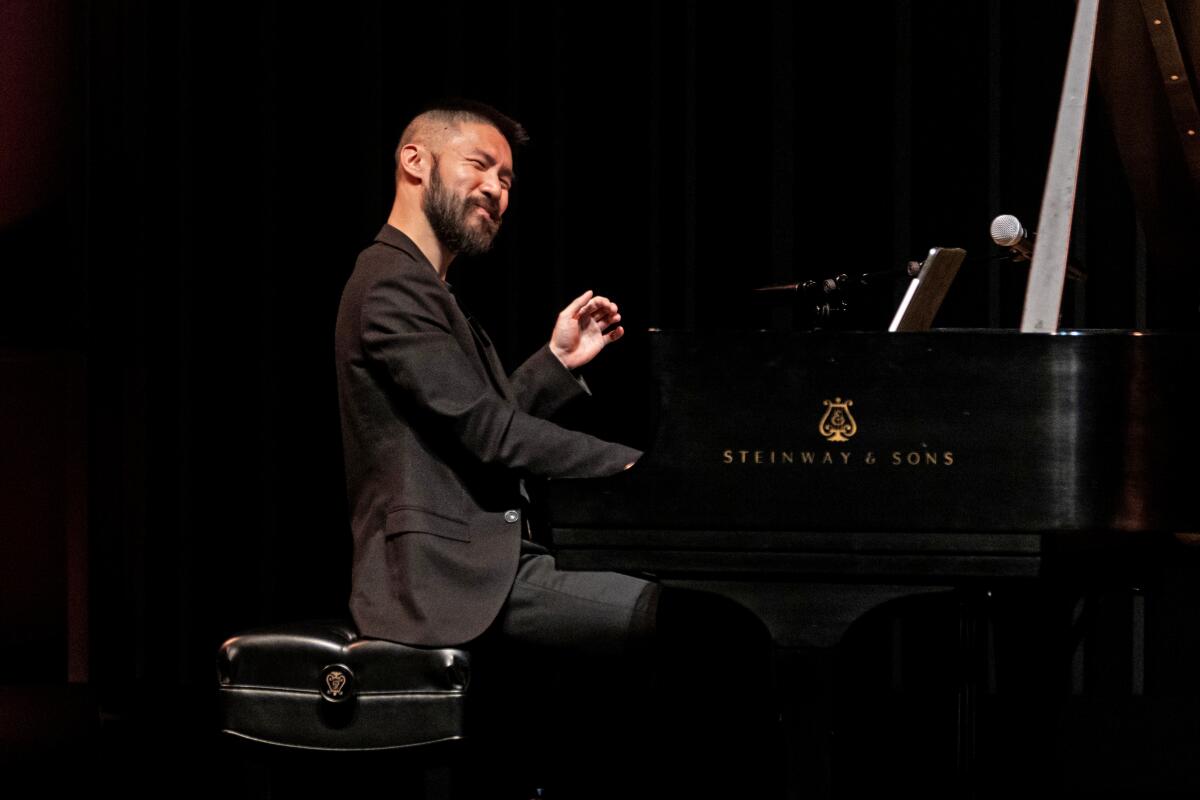
“Chevalier” is a new film directed by Stephen Williams that explores the life of Joseph Bologne, an 18th century composer born to a French plantation owner and an enslaved Senegalese woman. It’s an incredible story: about a mixed-race musician who went on to work with the Paris Opera and forge a friendship with Marie Antoinette. Unfortunately, the screenplay upon which the film is based, writes contributor Katie Walsh, is “rather trite and predictable.”
Essential happenings
Steven Vargas rounds up all there is to see and do, including a show of Alake Shilling‘s buggy pieces at Jeffrey Deitch and a Sondheim Celebration at the Pasadena Playhouse.
And Matt Cooper rounds up events around the Greater L.A. area by neighborhood, including a semi-staged production of “Rigoletto” at the Segerstrom and American Contemporary Ballet‘s immersive “Homecoming” in downtown L.A.
Moves
The National Endowment for the Humanities has announced $35.63 million in grants for 258 humanities projects across the country, including funding for a traveling exhibition on Mesoamerican approaches to color organized by LACMA’s Diana Magaloni.
Enjoying this newsletter? Consider subscribing to the Los Angeles Times
Your support helps us deliver the news that matters most. Become a subscriber.
The Seattle Art Museum has received a major gift of 48 works by Alexander Calder, accompanied by a $10-million endowment, from former Microsoft president Jon Shirley.
In 2014, the Fine Arts Museums of San Francisco was also on the the receiving end of a transformative gift: a collection of Indigenous art from Thomas W. Weisel. This month it’s releasing a 432-page volume of 206 objects from that collection — written and photographed in consultation with Indigenous cultural advisers.
Passages
Emmy-winning set designer John Iacovelli, known for his ability to create stage environments that channeled spectacle and “Beckettian minimalism” for both the stage and the screen, has died at the age of 64.
Todd Haimes, who helped steer New York’s Roundabout Theatre Company from near-bankruptcy into a Tony-winning theatrical force, is dead at 66.
Ryuichi Sakamoto, an avant-garde musician and composer whose ’70s-era techno-pop band Yellow Magic Orchestra made him an unlikely pop star, has died at 71.
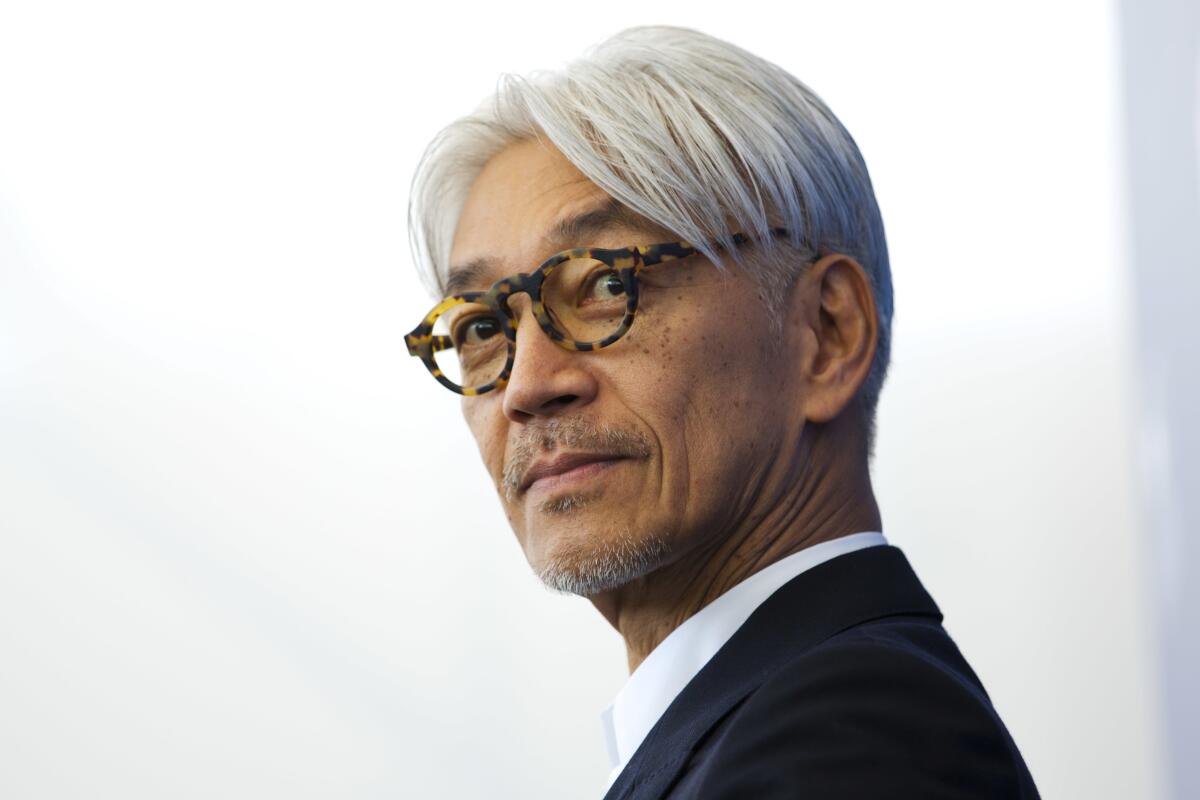
Eric Lloyd Wright, a Southern California architect who was also a grandson of Frank Lloyd Wright, is dead at 93.
Loren Cameron, a transgender portraitist who captured some of the quotidian aspects of trans life, died late last year at the age of 63.
In the news
— In honor of 4/20, design critic Alexandra Lange reports on the design of cannabis packaging, with nods to brutalist architecture and Luis Barragán.
— L.A. Weekly’s Shana Nys Dambrot looks at the “wild, sometimes outright visionary, and frequently hilarious” art and design from the days in which cannabis was not yet legal.
— A short but very interesting primer on Tony Hill, a pioneering, L.A.-based Black ceramicist who became known for his innovative lamp designs at mid century.
— Brad Pitt‘s foundation still owes Hurricane Katrina victims settlement money.
— Remember how I was blabbing last week about Hilma af Klint and ecologies of ideas? Well, it turns out that Af Klint had a raft of collaborators for her series “The Paintings for the Temple” — among them, painter Anna Cassel.
— Vulture has an interesting profile of Jaune Quick-to-See Smith.
— Nancy Baker Cahill has created an augmented-reality piece, “State Property,” that shows a uterus exploding over the U.S. Supreme Court building.
— The FBI has launched a stolen art app.
— During the early days of the pandemic, I caught a live broadcast of Miguel Gutierrez’s cabaret show “Sadonna” and was enthralled. Since then, he has joined the faculty at UCLA and has a rack of choreographic projects in the works.
— I really appreciated this episode of the podcast “Our Opinions Are Correct,” that looks at the roots of our culture’s obsession with the lone genius, a trope rooted in the inventor/madman of science fiction.
And last but not least ...
This week also marks Earth Day. Be respectful of the elder trees.
The biggest entertainment stories
Get our big stories about Hollywood, film, television, music, arts, culture and more right in your inbox as soon as they publish.
You may occasionally receive promotional content from the Los Angeles Times.




